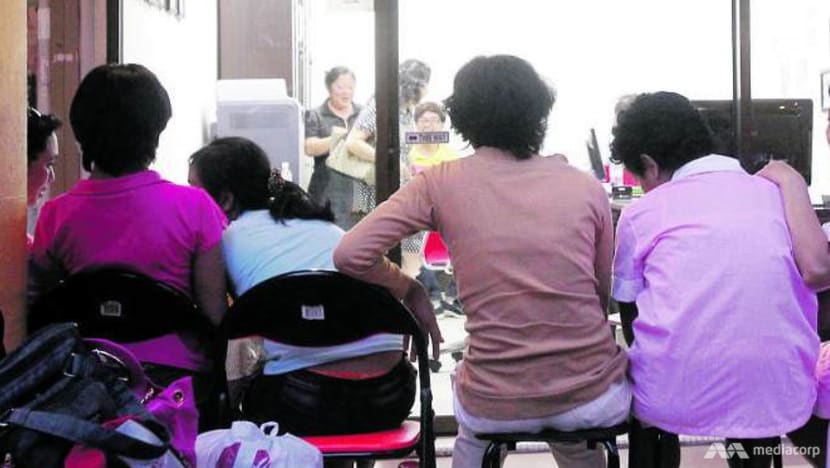Demand for new maids high despite extra costs amid COVID-19 restrictions, risk of imported cases

Foreign domestic workers in Singapore. (File photo: TODAY)
SINGAPORE: Demand in Singapore for new foreign domestic workers is going strong despite the extra costs involved in bringing them in amid the COVID-19 pandemic, said employment agencies.
Employers have to pay for the helpers' COVID-19 tests and their stay-home notice.
From Jan 1, employers must also get medical insurance with a coverage of at least S$10,000 for the workers' medical expenses if they develop COVID-19 symptoms or test positive within 14 days of arrival in Singapore. The insurance must be bought before they arrive in Singapore.
Service costs charged by agencies have also gone up because of the various administrative arrangements required amid the pandemic.
Still, agencies CNA spoke to said they are seeing an increase in the number of clients making requests for new domestic workers.
This is likely because between March and October, there were few or no domestic workers entering Singapore, said president of the Association of Employment Agencies K Jayaprema.
“Employers have been holding on for a long time to hire, and many of them have been facing a situation where their own current existing workers wanted to go back. Transfers have not been successful,” she added.
“Employers might not want to hire and take this financial risk, but many actually don't have much of a choice because of the way things have been. So although they have reservations, I think the ones who really need the help at home are moving forward to hire."
Inter Great Employment Agency’s general manager Chew Soon Chiah agreed that requests for foreign domestic workers have grown steadily over the last few months, while Orange Employment Agency owner Shirley Ng said that the employers willing to fork out extra costs now are the ones who “can’t live without a helper”.
WATCH: Fewer employers letting go of domestic workers during COVID-19
Among them are Mr Caleb Lim and his wife, who hired a foreign domestic worker in December to help with their newborn. “We felt that it would be good to have extra help, especially once we go back to work,” he told CNA.
They started looking for and interviewing foreign domestic workers in April, but because of COVID-19 restrictions, the domestic workers were unable to come to Singapore at the time. They also tried to look for transfer maids but were unsuccessful.
Finally in November, after approaching several agencies, they were put in touch with someone from Myanmar who was keen to work for a family with a baby.
The process of applying for a foreign domestic worker and helping her get to Singapore was “very smooth”, but Mr Lim said there was a “minor hiccup” when they could not get a plane ticket for her on the valid dates of her entry approval.
The agency had to cancel the first entry approval and apply for another one a week later, said Mr Lim.
WATCH: More entry approvals for foreign domestic workers compared to previous month: Maid agencies
DIFFICULTIES JUGGLING VARIOUS REQUIREMENTS
On top of obtaining entry approval from the Ministry of Manpower (MOM), employers and agencies must also deal with limited flights and the validity periods of COVID-19 tests. This makes the process an administratively tedious affair, they said.
Orange Employment Agency’s Ms Ng explained that she has to first get in-principle approval for the worker’s entry. After ensuring there are available flights, she then applies for entry approval, which is only valid for three days.
If there are no flights for the dates that the worker’s entry approval is valid for, the employment agency or employer must reapply for approval, she said.
According to the MOM website, domestic workers must also take a polymerase chain reaction (PCR) COVID-19 test within 72 hours before departure, and present a valid negative test result to enter Singapore.
The result can only come from laboratories that are internationally accredited or recognised by the respective countries’ authorities.
“Assuming I apply for (entry approval on) Dec 10, but now on Dec 10 there are no flights. You must also remember the girl has a 72-hour (validity window for the) PCR test, which will expire. We have to factor all this in. The stress is from this juggling,” Ms Ng told CNA.
Mr Chew added that getting flights is also a challenge particularly for workers from Myanmar, due to an international flight ban.
“Now the only flights available are relief flights arranged by the embassy. Fighting for tickets is a weekly thing,” he told CNA.
WATCH: Myanmar looking to recruit more volunteers for COVID-19 response
During the “circuit breaker” period, MOM approved 630 requests for foreign domestic workers mainly from Indonesia, the Philippines and Myanmar to enter Singapore, out of about 4,100 entry approval applications and appeals received, said Manpower Minister Josephine Teo in response to a parliamentary question in October.
The Manpower Ministry did not provide updated figures in response to CNA queries for the number of entry approval requests that have been approved to date.
READ: Commentary: It should not be this hard to hire a foreign domestic worker
FOREIGN DOMESTIC WORKERS WHO TESTED POSITIVE FOR COVID-19
Despite taking COVID-19 tests before entering the country, foreign domestic workers continue to make up a significant portion of Singapore’s imported cases every day.
Of the 29 imported cases reported in Singapore on Wednesday (Jan 6), 12 were foreign domestic workers. All of them were placed on stay-home notice or isolated upon their arrival in Singapore, said the Ministry of Health (MOH).
As of Dec 22, there were 303 COVID-19 cases who are foreign domestic workers, or about 0.5 per cent of the total number of cases in Singapore, said MOH in response to CNA queries.
Of these, 273 were imported cases and 30 were locally transmitted. All the imported foreign domestic worker cases were detected while they served their stay-home notice at dedicated facilities, said MOH.
Among the 30 locally transmitted cases, 24 were linked to a previous case in the employer’s household. Of the remaining six, none had spread the coronavirus to anyone in the employer’s household.
Ms Ng said the number of imported cases among foreign domestic workers was surprising given the testing requirements for entry.
“You cannot go to any clinic in your neighbourhood. I reckon the places that the (authorities) appointed must be fairly credible and big hospitals,” Ms Ng told CNA, adding that other medical factors might explain why the workers tested positive upon arrival.
To avoid COVID-19 cases, some agencies make arrangements for workers to stay in an isolation facility in their home countries after they take their COVID-19 test and before they leave for Singapore, said Ms Jayaprema.
“Because if they do their PCR test and they're still mobile or they go around, the chances of being infected are very high. So we actually have to provide them with these additional isolation facilities,” she added.
“In the past, we used to provide them with some kind of housing before they take their flight, but now additional resources have to be invested because we have to ensure that it is in isolation.”
READ: Philippines prolongs partial COVID-19 curbs in Manila to Jan 31
With this “intensified work”, the cost incurred by employment agencies has also increased. Even sourcing for potential workers can be challenging because some countries are still in lockdown, said Ms Jayaprema.
“Like for the domestic workers to be sourced, for them to travel out to town for deployment or to reach the airport, to go through the PCR test, everything is a lot more challenging now. It’s time-consuming, very difficult to access and it’s a lot more expensive,” she added.
HIGHER COSTS FOR AGENCIES AND EMPLOYERS
Making it to Singapore is just the beginning. Depending on where they are arriving from, most new foreign domestic workers have to serve their stay-home notice in a dedicated facility.
They must also take a COVID-19 test before their stay-home notice is over.
Only foreign domestic workers who arrive from Australia (excluding New South Wales state), Brunei, mainland China, New Zealand, Taiwan and Vietnam need not serve a stay-home notice if their test result is negative. But they must remain isolated in a hotel before the negative test results are out.
Employers or employment agencies must also ensure that the domestic worker has a Singapore mobile number. Her phone must have Internet connection and WhatsApp installed.
WATCH: Maid agencies, employers to bear cost of COVID-19 stay-home notices for new foreign domestic workers
The costs add up.
Employers should be prepared to pay upwards of S$3,000 in total fees to the agency and MOM, said employment agencies CNA spoke to.
“It used to be like S$1,800 or more if you’re looking at agency fees plus disbursements. It used to be about under S$2,000. That’s what your actual costing would be,” said Ms Jayaprema, estimating that employers pay more than S$3,000 now, including the costs of stay-home notice and PCR tests.
Specifically, costs for stay-home notice facilities come up to about S$1,500, while COVID-19 tests cost about S$200 each, said Orange Employment Agency’s Ms Ng.
She added that service fees have also gone up because “a lot more administration and coordination” is involved, requiring more man-hours.
Overall, she estimated that costs for employers have almost doubled, from S$2,500 to about S$4,800.
WATCH: What the shortage of foreign domestic workers means for Singapore
For Mr Lim and his wife, their employment agency did all the necessary applications for the couple and offered to absorb 40 per cent of the stay-home notice cost.
The domestic worker arrived in Singapore on Dec 11 and ended her stay-home notice on Christmas Day. She stepped into the couple's home on Dec 30 after her PCR test came back negative and she got her work permit registered.
For the whole process, Mr Lim and his wife paid the employment agency about S$1,900 for their services.
They paid another S$1,625 to the Government for the maid's stay at the dedicated stay-home notice facility and her COVID-19 test. When the helper was cleared to start work, they paid another S$900 for her security bond, after deducting the promised 40 per cent discount.
These extra costs were what initially put Mr Lim and his wife off from hiring a foreign domestic worker.
“We felt that it’s not worth paying that money. For young families like us, the S$1,700 is really a substantial amount, so that was why it put us off for so long," said Mr Lim.
While some agencies may offer discounts on agency fees or absorb part of the stay-home notice or PCR test costs, it is unlikely to be a large sum, said Ms Jayaprema.
“We have to be very logical about this. Agencies might partially absorb (costs), meaning they might be cutting their profit, but they’re still going to charge some form of agency fee,” she added.
“I would generally look at it as a higher probability that the employer is the one who's going to be absorbing all the costs, bearing all the costs. What we probably might see agencies do is probably do some profit cuts and that's it. It's not logical to say that agencies are going to bear it. It doesn't work like that.”
BOOKMARK THIS: Our comprehensive coverage of the coronavirus outbreak and its developments
Download our app or subscribe to our Telegram channel for the latest updates on the coronavirus outbreak: https://cna.asia/telegram
















